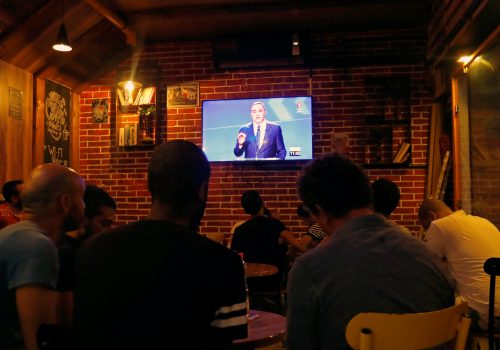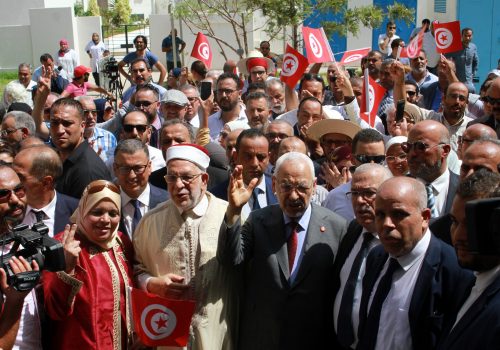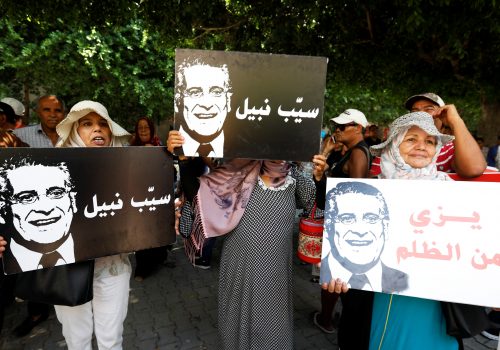Absence at Berlin conference highlights Tunisia’s difficult challenges
There was a great absence among the institutional representatives invited to the Libya Peace Summit in Berlin on January 19. It was a small, but significant country for the current geopolitical situation of the region: Tunisia.
Tunisia has paid a dear price for its proximity to the conflict in Libya, confronting migrant flows and terrorist attacks, but was nevertheless excluded from the European diplomatic initiative. This so-called marginalization aroused strong feelings of resentment among Tunisians, exacerbating the country’s already difficult economic, social, and political challenges.
The country’s October 2019 parliamentary elections resulted in a fragmented parliament unable to deliver a working majority (Ennahda represents the largest party, but with a fragile relative majority of 52 seats in the 217-member parliament). Since then, Tunisia seems to be trapped in a phase of socio-economic uncertainty and political stalemate, accentuated by the difficulties of forming a new government. The polarized divisions among the political parties became evident when, on January 10, the Tunisian People’s Assembly rejected a confidence vote on the government of independent lawmakers proposed by Prime Minister-designate Habib Jemli. Later on, President Kais Saied, who holds the authority to appoint the head of government when there is no clear majority, charged Elyes Fakhfakh, a former tourism and finance minister, with the difficult task of assembling the country’s next government. This represents the parliament’s last chance. In the case of another failure, Saied will be forced to dissolve the National Assembly and call for a new election, which could represent a further setback for the program of economic reforms that Tunisia must undertake in the shortest amount of time possible.
This political impasse highlights how radical the division within the parliament appears—it reflects people’s disillusionment with established parties over the perceived mishandling of economic and social problems. The election of Saied himself is the result of this widespread discontent. A conservative academic considered a political outsider and elected in October 2019 with a vast majority, Saied has repeatedly expressed his independence from parties, his lack of faith in the parliamentary system, as well as his will to revise the constitution to return to a presidential system.
As a result, two months after the elections, the new government is deadlocked in an endless conflict between the head of state and the parliament over the distribution of ministerial posts. Furthermore, this situation shows the first evident political defeat for Ennahda, which is substantially shifting the balance of power in Tunisia. Backed by Ennahda, Jemli represented the winning horse of Rached Ghannouchi, the leader of the movement and current speaker of parliament. Although Jemli and his cabinet were proposed to the public as a government of independent technocrats to avoid political polarization and prevent the MPs’ objections, this escamotage did not work. Other parties and MPs indeed called into question whether Jemli and his “government of expertise” were truly independent, spoiling Ennahda’s gamble.
Jemli’s failure to win the confidence of the parliament has other implications as well. In fact, Ennahda’s setback represents a strategic error for the party, which is still the largest in the new assembly but has overestimated its negotiating ability. Moreover, Ennahda shows internal fractures—many in the party interpreted the Jemli proposal as a betrayal of the election mandate, a sort of “casting mistake” that might provoke a political fitnaor division within the group.
According to some analysts, Ennahda, so powerful in the aftermath of the 2011 revolution, today pays the price of nine years of slow economic recovery and unfulfilled promises of social adjustments. The party has already seen its popular support decline—from 89 seats in the 2011 elections to 69 seats in 2014, to only 52 seats in the 2019 consultation—and now fears that its inability to form a government, despite having the relative majority, may lead other voters to lose confidence in its ability to govern.
This failure could also open the door to a political reconfiguration within the assembly. Despite the political fragmentation, an opposition front seems to be emerging, ready to question Ennahda’s control of key portfolios such as the ministries of Justice and Interior. Nabil Karoui, leader of the populist party Qalb Tounes, the second largest group in parliament, might become its frontrunner.
The most dangerous consequence of this stalemate is the further delay of reforms necessary to revamp the economy of a country plagued by economic and social difficulties. The Tunisian population was hit hard by the unpopular reforms and austerity promoted by previous governments, which have been unable to solve Tunisia’s chronic economic problems. Above all, economic analysts fear high unemployment—currently at 15 percent and even more widespread among the youth at nearly 35 percent—as well as the 40 percent loss of purchasing power and the projected record-high public debt of over 89 percent in 2020. The period of belt-tightening promoted in the framework of a restructuring plan for the national economic system, financed largely by the International Monetary Fund (IMF) with a loan of around $3 billion, caused widespread discontent among the population. While more sustained GDP growth is expected in 2020—2.7 percent during 2019 versus 1.9 percent this year—the health of the Tunisian economy remains precarious. This social and economic crisis could lead to a general decrease in security, giving way to the rise of violent Islamist radical movements, which could try to destabilize the current political-institutional system.
In this context, the economic credentials of Fakhfakh, the new prime minister-designate, were a decisive factor in the president’s choice. A new round of popular voting could become an unsustainable setback for a country that needs to secure another loan from the IMF to cover the 2020 budget and apply a new set of austerity policies. Fakhfakh faces the difficult task of forming a government and gaining the approval of enough of parliament’s parties and lists. In any case, even if a new cabinet eventually manages to obtain parliamentary approval, its majority is likely to be so small that a new government would be short-lived, increasing the probability of a fresh election in the next months.
Besides the economic challenge, there is also an evident, though unofficial, political test. In appointing Fakhfakh, Saied demonstrated his independence from the parties but, above all, paved the way for the marginalization of Ennahda, which would be relegated to the uncomfortable position of being the single largest party, but without any true power. And Tunis cannot ignore the international context, that the Berlin Conference underlines once again the fact that Tunisia has for years played a crucial role as a logistics hub for all the international missions and meetings on Libya, but still has a limited geopolitical position in regional dynamics. Much worse, Arab countries like Egypt and the United Arab Emirates refused to accept Tunisia as an international player in the Libyan stabilization process. This “marginalization” of the country aroused more than a few disgruntled voices in the Tunisian establishment. But as it grasps for geopolitical relevance in its neighborhood, the country also faces political, social, and economic conditions too critical for a country that is still in transition and aspires to complete the passage from an authoritarian regime to a fully democratic system.
Dr. Alessia Melcangi is an assistant professor of contemporary history of North Africa and Middle East at the Sapienza University of Rome.
Image: UN Envoy for Libya Ghassan Salame, United Nations Secretary-General Antonio Guterres, Germany's Chancellor Angela Merkel and Germany's Foreign Minister Heiko Maas attend a news conference after the Libya summit in Berlin, Germany, January 19, 2020 (Reuters)


